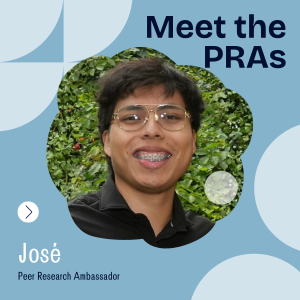Meet José Matute Gálvez ’26, an OUR Peer Research Ambassador majoring in Molecular and Cell Biology, Allied Health Sciences and Biochemical Systems in Health and Disease (individualized major).
major).
What is the focus of your research/creative activity?
My research focuses on designing light-sensitive small molecules that can be used to investigate how cells communicate with one another. In particular, I am developing “photoswitchable” compounds that target calcium release-activated calcium (CRAC) channels, which regulate calcium entry into cells through store-operated calcium entry (SOCE). By attaching light-sensitive groups to known inhibitors of these channels, I can switch their activity on and off with specific wavelengths of light. This precise control makes it possible to study cellular signaling in ways that traditional methods cannot, offering new insights into how calcium regulates key biological processes.
Why did you get involved in research/creative activity?
Transferring from Manchester Community College was a big change, and it came with a desire to prove to myself that I could both succeed and find my place at a large university. Getting involved in research not only helped me build a new community but also showed me how the concepts I learned in class applied to real scientific discovery. Once I joined the Kienzler Laboratory, I discovered that I enjoyed both the creativity of organic chemistry and the problem-solving involved in testing molecules in living cells. This experience ultimately led me to develop my own independent project, secure funding, and present my findings to diverse audiences, experiences that have been some of the most rewarding parts of my undergraduate journey.
What advice would you give to aspiring student researchers?
Be open-minded and persistent. You don’t need to have everything figured out before you start. What matters most is your curiosity and your willingness to adapt. Don’t be afraid to reach out to faculty or mentors, even if their research is outside of your knowledge’s comfort zone. Most importantly, remember that research is full of trial and error. The setbacks are just as valuable as the successes, and both will help you grow as a student, researcher, and person.
What do you enjoy the most about participating in research/creative activity?
I enjoy the moments when everything finally comes together, whether it is successfully synthesizing a molecule after weeks of troubleshooting or seeing that the compounds I created actually work when tested in cells. Presenting my research at conferences and symposiums has made those moments even more meaningful, as I get to share the hard work behind the discoveries with others.
Describe the impact your research experience/creative activity has had on you.
Research has taught me resilience, patience, and the ability to think creatively about complex problems. It has given me the confidence to design and lead projects on my own from start to finish, skills that I know will carry over into my career in dentistry. Most importantly, it has shaped the way I approach challenges, not as obstacles, but as opportunities to learn and grow.
What is your greatest accomplishment so far?
My greatest accomplishment so far has been developing my own independent project in the Kienzler Laboratory and seeing it grow from an idea into a funded research project. Receiving the IDEA Grant and being selected for the University Scholar Program were affirmations of my hard work, but the most rewarding part has been sharing my research through presentations. I am especially excited that this journey is now allowing me to travel to San Antonio to present at a national conference.
What are your plans after graduation? How has involvement in research/creative activity influenced your plans and/or prepared you for the future?
After graduation, I plan to attend dental school. My involvement in research has strengthened my problem-solving skills and given me a strong foundation in scientific thinking, which I believe will help me become the best clinician I can be. It has also shown me the importance of mentorship, and I hope to continue supporting other students, especially those who are first-generation, from minority backgrounds, or transfer students, in finding opportunities that will shape their own paths, just as they have shaped mine.